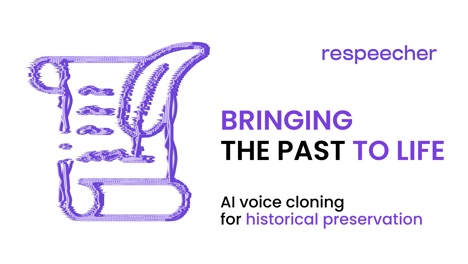Opportunities that Voice Cloning Brings to Voice Actors

There’s no doubt that AI voices deliver a number of benefits to businesses seeking to cut costs and time on producing different types of audio or mixed content. However, what about those who are (or were) central figures of the voice-over industry? There is the existing fear in the voice-over industry that actors may lose their profession due to the increasing capabilities of voice cloning technology.
However, are these concerns even close to the real state of affairs? Or maybe there are more benefits and opportunities for voice actors thanks to modern voice cloning technology? Let’s figure that out.
Voice cloning concerns
Like so many other industries where technology is changing the working place, voice actors have concerns that voice cloning technology will render their jobs obsolete. So let's make it clear why this fear is unfounded:
-
First, the work of a voice actor cannot be replaced by AI due to holistic constraints. For example, text-to-speech technology will not be able to implement all the voice nuances a human being can produce, and there is no ability to add the necessary shade to speech at any time. One can’t control AI to the same extent one can control their vocal apparatus - an amazing instrument a human was born with.
-
It's the same with speech-to-speech, which always requires an actor anyway. And one actor, whose voice will be cloned, will not be able to replace all the other actors. The fact is that the volume of content is growing rapidly every year. At the same time, the number of voice actors entering the industry is slow. Accordingly, thanks to the global growth of audiovisual content produced globally, there is only more work for voice actors, regardless of whether their voice is cloned or they only work with their voice, or utilize voice changers.
But what about opportunities?
Despite all the fears, today’s voice cloning capabilities are of increasing interest to actors. Here are some of the opportunities that the technology is capable of delivering:
-
Work allocation. How are voice actors hired? Several factors play an important role here. The first factor is their level of professionalism, their acting skills, and how they fit the character. The second is their voice. But the possibilities of a single voice are limited. There are cases when one actor voices 6-7 different characters. But usually, one actor = one character. Voice cloning technology makes it possible to hire actors not for their voice but only for their other acting qualities. Thus, we get a fairer selection and a better work allocation for the actor.
-
Character voices. Voice actors often have the task of performing unusual voices. It can be the voice of some magical object, the voice of some mystical character or animal, and so on. Such tasks are popular in the voice acting of video games. Often, these voices require a special load on the vocal cords, after which the actor needs a mandatory rest. Actors tell us cases when they can do a particular voice for only15 minutes a day and then they’re not able to work this day anymore. Also in many character-voices cases - it really hurts, physically. AI voice over technology offers a solution by providing limitless, strain-free character voices, revolutionizing character creation in media.
Thanks to voice cloning technology, it is possible to take a recording of an actor's voice character and replicate it to conserve the actor’s health and extend the capabilities of their voice.
-
Voice rejuvenation. It often happens that for the voice acting of games, flashbacks with a younger version of a character are needed. But the actor who voiced the character has also aged. Their voices crack or have hardened. Finding another young actor with the same voice is almost impossible. In addition, the actor also wants to stay on the project and continue to voice their character. Voice cloning technology easily solves this problem.
-
Multilinguality and accent. Voice cloning can also be used to translate an actor's words into different languages. This means that for some pieces of content, actors don’t need to learn a new language (or languages). They can focus on acting at their best without being disturbed or confused by the need to practice an entirely new skill. Also if a content creator needs a particular actor to have an accentified voice for the piece, the voice changer software can be utilized. The voice can be driven by another person who has the required accent.
-
Monetization. Actors get the opportunity to monetize their voices without having to directly work in voice acting. When an actor makes their voice available on a text-to-speech platform, they receive transactions from each order. In addition to money, actors make themselves known and strengthen their voice brand when a customer purchases the voice of a particular actor. For example, a voiceover artist and actor from Texas, Mr. Heller, turned to voice cloning to future-proof their career. The actor says that in case he is double-booked, his voice clone can do one of the jobs instead.
Make voice cloning technology work for you
People invented technology so that other people can reap the benefits of it. If you are afraid of something, maybe all you need is to look at it from a different angle. Instead of seeing obstacles, you may see opportunities that no one else has noticed. With AI voice over, explore new avenues and unlock the full potential of character voices in media.
Respeecher is at your service to help you leverage all the benefits of voice cloning technology.
FAQ
Synthetic voices are generated using Voice AI technology for legitimate applications like marketing, entertainment, and healthcare. Deepfake voices, on the other hand, are primarily designed to deceive or impersonate someone without their consent, raising serious ethical voice cloning and fraud prevention concerns.
Voice cloning can significantly aid patients with speech disorders, including those suffering from Parkinson’s or laryngeal cancer. By using AI-powered voice solutions, patients can regain clarity and naturalness in their speech, improving communication and enhancing quality of life with ethical voice cloning practices.
AI-generated voices raise ethical concerns related to deepfake audio technology, especially regarding impersonation and fraud. Ensuring ethics in voice synthesis involves obtaining consent from voice owners, preventing malicious use, and enforcing fraud prevention measures in synthetic voice applications.
Respeecher follows strict ethical guidelines by requiring written consent from voice owners and working only with trusted clients. Through transparency and ethical voice cloning, Respeecher ensures that its Voice AI technology is used for legitimate purposes like synthetic voice applications in entertainment and healthcare.
Yes, deepfake voice generators can be detected using advanced AI-powered voice solutions that identify inconsistencies in speech patterns. These detection tools play a crucial role in fraud prevention in deepfakes, helping distinguish authentic voices from AI-generated ones and ensuring responsible use of deepfake audio technology.
Glossary
Deepfake Voice Generator
A tool using Voice AI technology to create AI-generated voices, raising concerns in ethical voice cloning, deepfake audio technology, and fraud prevention in synthesis.
Voice AI Technology
A field using AI-powered voice solutions and deepfake audio technology to create synthetic voices, with applications in healthcare, ethical voice cloning, and fraud prevention.
Ethics in Voice Synthesis
A framework addressing the responsible use of Voice AI technology, focusing on AI-generated voices, ethical voice cloning, and fraud prevention in deepfake audio tech.
Synthetic Voice Applications
The use of Voice AI technology and AI-generated voices in fields like healthcare, ethical voice cloning, and fraud prevention, leveraging deepfake audio technology.
AI-Generated Voices
Voices created using Voice AI technology and deepfake audio technology, enabling synthetic voice applications, ethical voice cloning, and fraud prevention in AI-powered solutions.
Ethical Voice Cloning
The responsible use of Voice AI technology to replicate AI-generated voices, ensuring transparency, avoiding misuse, and addressing fraud prevention in synthetic voice applications.
Deepfake Audio Technology
A form of Voice AI technology that creates AI-generated voices, raising ethical concerns in voice synthesis, fraud prevention, and synthetic voice applications.
Voice AI for Healthcare
The use of Voice AI technology and AI-generated voices to improve patient care, communication, and diagnostics while addressing ethics in voice synthesis and fraud prevention.
Fraud Prevention in Deepfakes
Strategies using Voice AI technology and AI-powered voice solutions to detect and prevent misuse of AI-generated voices and deepfake audio in fraudulent activities.
AI-Powered Voice Solutions
Technologies leveraging Voice AI and AI-generated voices for applications like healthcare, ethical voice cloning, fraud prevention, and deepfake audio detection.
Voice Cloning
The use of Voice AI technology to replicate AI-generated voices, enabling ethical voice cloning and synthetic voice applications while addressing deepfake fraud prevention.
Speech Synthesis
The process of using Voice AI technology to generate AI-powered voices, enabling synthetic voice applications, ethical voice cloning, and deepfake fraud prevention.
Deepfake Detection Algorithms
Tools using Voice AI technology to identify AI-generated voices and deepfake audio, ensuring fraud prevention and ethical voice synthesis in synthetic voice applications.

- voice cloning
- voice conversion
- synthetic voice
- text-to-speech (TTS) synthesis
- speech-to-speech (STS) voice synthesis
- voice cloning technology,
- AI voice
- voice cloning software
- AI deepfake voice
- AI voices
- Respeecher
- voice cloning speech synthesis
- voice cloning solutions
- Speech
- voice actor
- actor
- voice actors
- generative AI
- AI voice cloning technology
- voice changer
- AI voice over
- Respeecher for Business
- Voice Actors and Celebrities
- voice ai
- voice changer software





